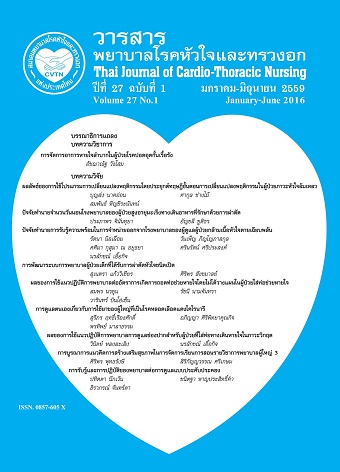ผลลัพธ์ของการใช้โปรแกรมการเปลี่ยนแปลงพฤติกรรมโดยประยุกต์ทฤษฎีขั้นตอน การเปลี่ยนแปลงพฤติกรรมในผู้ป่วยภาวะหัวใจล้มเหลว
Keywords:
ทฤษฎีขั้นตอนการเปลี่ยนแปลงพฤติกรรม, ผู้ป่วยหัวใจล้มเหลว, ความสามารถการเดินใน 6 นาที, transtheoretical model of behavioral change, patients with heart failure, six-minute walking testAbstract
การวิจัยครั้งนี้เป็นการวิจัยกึ่งทดลองเพื่อศึกษาผลลัพธ์ของโปรแกรมการเปลี่ยนแปลงพฤติกรรมโดยประยุกต์ทฤษฎีขั้นตอนการเปลี่ยนแปลงพฤติกรรมต่อความรู้ พฤติกรรมการดูแลตนเองและความสามารถการเดินใน 6 นาที ของผู้ป่วยที่มีภาวะหัวใจล้มเหลว กลุ่มตัวอย่าง คือ ผู้ป่วยที่เป็นโรคหัวใจและหลอดเลือดที่ได้รับการวินิจฉัยจากแพทย์ว่ามีภาวะหัวใจล้มเหลว ที่รับการรักษาจากแพทย์ในโรงพยาบาลพระจอมเกล้า จังหวัดเพชรบุรี จำนวน 60 ราย เป็นกลุ่มทดลอง 30 รายได้รับโปรแกรมการเปลี่ยนแปลงพฤติกรรมโดยประยุกต์ทฤษฎีขั้นตอนการเปลี่ยนแปลงพฤติกรรมของโปรแชสกา (Prochaska) ส่วนกลุ่มควบคุม 30 ราย ได้รับการพยาบาลตามปกติ วิเคราะห์ข้อมูลด้วยโปรแกรมคอมพิวเตอร์สำเร็จรูป ด้วยสถิติเชิงบรรยาย สถิติ non parametric สถิติ t-test และ ANCOVA
ผลการศึกษาพบว่า หลังการใช้โปรแกรมการเปลี่ยนแปลงพฤติกรรมโดยประยุกต์ทฤษฎีขั้นตอนการเปลี่ยนแปลงพฤติกรรม ผู้ป่วยภาวะหัวใจล้มเหลวในกลุ่มทดลองมีค่าระดับคะแนนเฉลี่ยคะแนนความรู้ พฤติกรรมการดูแลตนเองในการป้องกันและควบคุมภาวะแทรกซ้อนและความสามารถการเดินใน 6 นาที มากกว่ากลุ่มที่ได้รับการพยาบาลตามปกติอย่างมีนัยสำคัญทางสถิติที่ระดับ 0.05
จากผลการศึกษาแสดงให้เห็นว่าโปรแกรมการเปลี่ยนแปลงพฤติกรรมช่วยส่งเสริมให้ผู้ป่วยภาวะหัวใจล้มเหลว มีความรู้ พฤติกรรมการดูแลตนเองในการป้องกันและควบคุมภาวะแทรกซ้อนและความสามารถการเดินใน 6 นาทีดีขึ้น ดังนั้น จึงเป็นโปรแกรมที่พยาบาลควรพิจารณาประยุกต์ในการดูแลผู้ป่วยโรคเรื้อรังอื่นๆ ต่อไป
The outcomes of the application of the Transtheoretical model of Behavioral Change on patients with heart failure
This research was a quasi-experimental research which aimed to study the outcomes of the application of Transtheoretical Model of Behavioral Change on knowledge, self-care behaviors, and six-minute walking test of patients with heart failure. Samples were 60 patients with coronary artery disease with the diagnosis of heart failure, and receiving medical care at Phrajomklao Hospital in Petchaburi province. Thirty patients were in the experimental group and received the program of Transtheoretical Model of Behavioral Change based on Prochaska’s Transtheoretical Model of Behavioral Change. Another 30 patients were in the control group and received regular nursing care. Data were analyzed by using descriptive statistic, non-parametric including t-test, and ANCOVA.
Results of the study after the program application revealed that samples in the experimental group who received the program had higher scores of knowledge and self-care behaviors to prevent and control complications than those who did not receive the program (p-value < 0.05). They also had a significantly higher score of six-minute walking test than those who did not receive the program (p-value < 0.05).
The study showed that behavioral change program helped patients with heart failure to improve knowledge, self-care behaviors of prevention and control complications, and the ability to walk in six minutes better. Therefore, this program should be applied in another patient group with non-communicable chronic diseases based on nurses’ consideration.
Downloads
How to Cite
Issue
Section
License
บทความนี้ยังไม่เคยตีพิมพ์หรืออยู่ในระหว่างส่งไปตีพิมพ์ในวารสารอื่น ๆ มาก่อน และกองบรรณาธิการขอสงวนสิทธิ์ในการตรวจทาน และแก้ไขต้นฉบับตามเกณฑ์ของวารสาร ในกรณีที่เรื่องของท่านได้ได้รับการตีพิมพ์ในวารสารฉบับนี้ถือว่าเป็น ลิขสิทธิ์ของวารสารพยาบาลโรคหัวใจและทรวงอก






